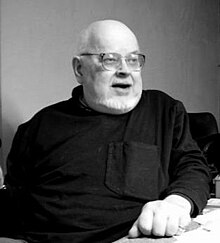Tékumel
While at Berkeley, Barker had not set aside his world creation project. Indeed, despite stepping back from an active role in science fiction fandom, he had commenced "proto-gaming" with a group of like-minded science fiction fans including fellow linguist Bill Shipley and Victor Golla, producing elaborate documents to support the exploration of that shared world.
Having watched the Dungeons & Dragons games started by Mike Mornard, one of the original testers for D&D, when Mornard moved to Minneapolis from Lake Geneva, Wisconsin, Barker resolved to create his own ruleset based on his own created world and the game mechanics from D&D. After six weeks, this was self-published in August 1974 as Empire of the Petal Throne and play commenced forthwith, including such occasional members as Dave Arneson – who singled out Barker and Tékumel as being his favorite Dungeon Master and roleplaying game, respectively – from early days.
Once Gary Gygax's attention had been drawn to Barker's work, it was decided that TSR would publish a revised version of the game mechanics along with a condensed version of his campaign setting. Empire of the Petal Throne was published by TSR in August 1975 for Gen Con VIII, making it the third role-playing game from TSR. : 8 In a December 1976 editorial for The Dragon magazine, editor Tim Kask drew comparisons between the world of Tékumel and J. R. R. Tolkien's Middle-earth not in terms of literature created, nor that his work was derivative of Tolkien's, but rather regarding the in-depth detail in the setting, mythos and linguistic backgrounds and concluded that "In terms of development of detail, I think EPT [Empire of the Petal Throne] has it over Middle Earth in the matters that most concern gamers" since it had been developed by a "wargamer", whereas Tolkien had no such background and having died prior to the release of D&D was thus unable to address this new pastime personally.
Barker disliked the limited support TSR gave to the setting, and after 1977 he took his Tékumel setting back from TSR and ultimately brought it from one publisher to another: Imperium Publishing (1978), Adventure Games (1981), Gamescience (1983–1984), Tékumel Games (1983–1986), Different Worlds Publications (1987–1988), TOME (1991–1994), Tita's House of Games (1997–2002), Zottola Publishing (2002–2003), and Guardians of Order (2005). : 8 Barker had a personal friendship with Dave Arneson, which led to Arnesons's company Adventures Games releasing several books for Tékumel, such as army lists, maps and reference material. : 39 DAW published the novel The Man of Gold (July 1984) by Barker, which took place in Tékumel. : 238 His second novel, Flamesong (1985), was also published by DAW.
Despite having had a head start on other in-depth campaign settings and seeing his game released no less than four times with various supplements and magazine articles, many which he contributed to, and having authored five books using the same setting, Barker's Tékumel in both roleplaying and literary domains is still well known to only a relatively small audience, leading German magazine Der Spiegel in 2009 to publish an article on Barker's life entitled "Der vergessene Tolkien" ("The forgotten Tolkien"). The article quotes friends and acquaintances who posit that this may be, at least in part, due to the unfamiliarity of the setting compared with Western society, echoing Fine's observations from 1983, and possibly even that Tékumel was released to the gaming world too early on, when players had only just started to experiment with their own invented worlds rather than fitting their play into preconfigured, non-literary domains with novel backgrounds.
In 2008, Barker founded the Tékumel Foundation along with many of his long-time players "to support and protect the literary works and all related products and activities surrounding [his] world of Tékumel and the Empire of the Petal Throne." The Foundation acts as his literary executor.
